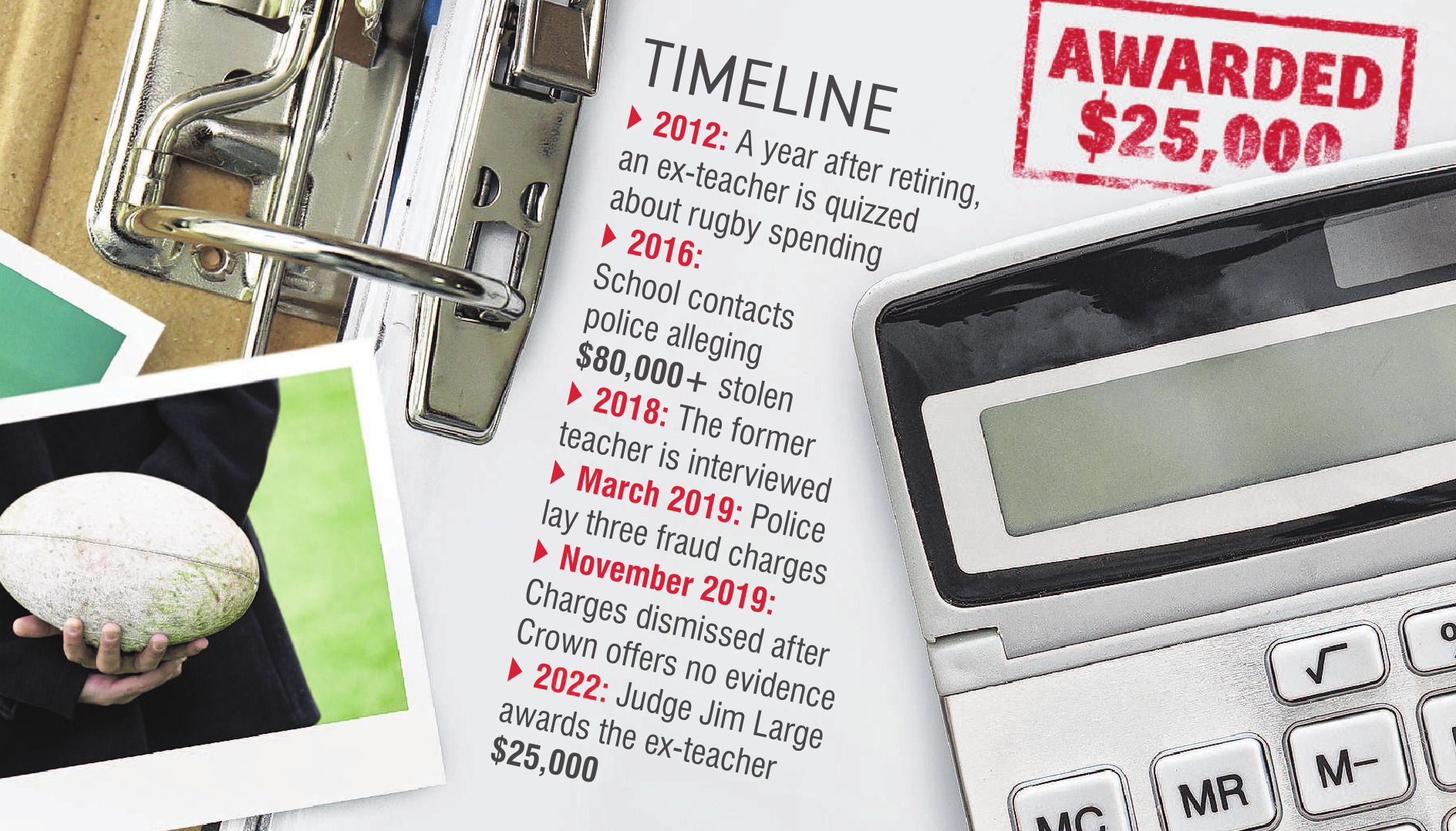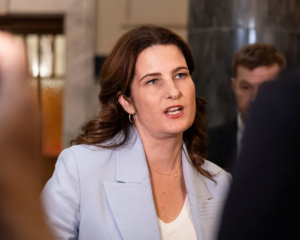
Bruce Wilson* had devoted his working life to the school - whose name, along with his, was suppressed by the court - and voluntarily given up countless hours to ensure the smooth running of the sport.
"He ran, essentially, a massive club on the smell of an oily rag, on goodwill and an enormous amount of time and effort," his barrister Lisa Preston told the Otago Daily Times, speaking on his behalf.
Several years after his retirement, his loyalty and commitment were repaid with allegations of a nine-year fraud in which he supposedly swindled more than $80,000.
Following a prosecution marred by its reliance on hearsay and opinion, rather than facts, the Crown offered no evidence and charges were dismissed at the Dunedin District Court in November 2019.
A two-year battle followed, which recently ended with Judge Jim Large making the costs order in favour of Mr Wilson.

"I consider that the prosecution was not conducted in a reasonable and proper manner in this case," the judge said.
And while it was vindication for Mr Wilson, the sum only covered a fraction of the costs incurred in defending the charges.
It had come at a psychological cost too, Ms Preston said.
"He has been horrified by the process and somewhat bruised by it," she said.
Delays
In 2012, a year into his retirement, Mr Wilson was summoned to a meeting with the principal and the deputy at his former workplace.
Questions were raised about his use of a rugby-related bank account of which he was signatory, stretching back to 2002, and he was candid in his explanations.
Then nothing.
It was four years before Mr Wilson’s ex-boss finally went to police, and the delays in the case did not end there.
Officers held on to the file for a year before the investigation began, which they later told the ODT was "due to the prioritisation of other operational matters".
By the time they got round to interviewing Mr Wilson it had been two years of inaction.
Keen to clear his name, the man agreed to speak to an experienced detective, a filmed interview that lasted nearly four hours.
But he was left feeling dismissed and disbelieved.
In one hearing, Ms Preston told the court her client believed there was "some active disinterest expressed by the officer on some key points".
In short, Mr Wilson felt his guilt had been predetermined.
Despite his denials, police laid two charges of theft by failing to account and one of theft in a special relationship.
Evidence
The case against him centred on a "cash account" which he was alleged to have hidden from the school to siphon off rugby money for his own personal use.
The treasurer from that time told police "the school had absolutely no knowledge of the account" and that the school paid for "99.9%" of rugby expenses during the period.
The evidence, however, proved that to be totally untrue.
Mr Wilson originally created the account in 1998 to hold funds for an upcoming tour, after which it was promptly closed.
A few years later, a significant sum of money was stolen from the school’s office and so he re-established it to safeguard the rugby funds.
Despite what police were told, there was no attempt to keep the account secret.
Bank statements were sent to the school office and there was a ledger which was audited on an annual basis, clearly showing rugby-related expenditure.
While police obtained the ledger early in the investigation, officers failed to note the existence of the cash account or the significance of the document.
There were also transactions between another rugby account and Mr Wilson’s, something that would have required authorisation by the school.
All this wholly contradicted the claim that the man had somehow acted furtively.
The ex-head of rugby used the account to pay for petrol vouchers, gear bags, certificates, food, trophies and social functions.
There was even evidence the then principal - despite his claims to the contrary - was aware of some of those expenditures.
Another crucial element exonerating Mr Wilson was an email chain from the school’s board confirming he had not hidden the account, nor had his superiors given him any guidelines or directions about the financial operation of the rugby club.
Red flags
"There were not just one or two red flags but a significant number," Ms Preston said.

The evidence simply did not point to Mr Wilson - now aged in his 70s - as an underhanded swindler.
His and his wife’s bank accounts over the period of the alleged crimes were scrutinised and there were no abnormal or inexplicable cash injections.
They had the same car, lived in the same home and had only one overseas holiday during that time, the court heard.
The ex-principal told police he suspected Mr Wilson had pocketed a tax rebate in relation to a donation that had been used to establish a rugby scholarship.
But information from the IRD refuted that.
Those documents were obtained by police in December 2018, yet they were only disclosed to Mr Wilson and his barrister nine months later.
It was a small part of the 2000 pages of discovery that were provided after charges were laid, something Ms Preston said was symptomatic of a defective case and a school whose record-keeping was "in disarray".
It also added significant cost to preparing for a trial which ultimately never took place.
Weak case
After multiple requests, Crown prosecutor Marie Grills reviewed the file and pulled the charges.
In the aftermath, she argued the major fault lay with the school in its decision to wait so long before approaching police.
Against that background, costs should not be awarded to Mr Wilson, she said.
With regards to the officer in charge of the case, Ms Grills stressed there was no suggestion her mistakes were anything other than inadvertent.
When the detective interviewed Mr Wilson, she had been unwell all week and had not fully recovered, she said.
Ms Grills said the police were entitled to place weight on the allegations of the complainants, who had been in positions of authority at the school.
But Judge Large was scathing in his analysis.
"The prosecution plainly failed to properly investigate the claims made by various members of ... staff. It is also relatively clear that the prosecution failed to consider the evidence through an objective lens and failed to resolve the case in a timely manner," he said.
"I consider that the prosecution was not conducted in a reasonable and proper manner in this case."
While the judge accepted the historical case was inherently complex by its nature, he said the evidence was always "weak".
Because, in his assessment, no particular person had acted negligently or in bad faith, the $25,000 bill would lie with the chief executive of the Ministry of Justice.
Unapologetic
When contacted by the ODT, the former principal at the school expressed surprise that the charges against Mr Wilson had been dismissed.
No-one had told him.
He refused to go into detail about the background but said he had no grudge against his former staff member.
So was he sympathetic to the man’s six-year ordeal, sparked, at least in part, by his allegations?
"Somebody else made all the decisions. You need to talk to them about what they did but I certainly wouldn’t apologise to him," the ex-head said.
"I hope he spent more than $25,000 because I’d hate to think he got a pay-day out of this."
The ex-treasurer refused to comment.
The ODT asked the police several questions, seeking clarification on specific facets of the case.
A spokeswoman responded with a five-sentence statement which said once the prosecution began it was "dealt with in a timely manner".
"Police adhered to the investigation processes and practices expected for such a matter, including interviewing the suspect and consulting with the Crown solicitor before charges were filed," she said.
He failed to answer whether any protocols had changed as a result of the case or whether they could give the public assurances similar instances would not arise in future.
The police were also silent on whether they would consider apologising to Mr Wilson.
While it may not pay his hefty legal bill, Ms Preston, speaking on her client’s behalf, believed it would provide some small solace.
She described Mr Wilson as "old-fashioned".
"He’s good-hearted. I think an apology would’ve been welcome."
*Pseudonym used to protect defendant’s identity













